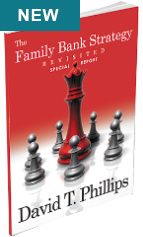

By David T. Phillips, CEO, 9/17/19
Estate Planning Specialists
The other day I met new clients for the first time, Jim and Debbie. I asked them to bring, among other documents, their current insurance policies and their Wills to the meeting. Jim and Debbie are in their early 40s and have twin daughters, Dana and Donna, age 10. While reviewing their current life insurance policies, I noticed a huge hole in their estate plan: the beneficiary designations of their policies were a mess. A mistake that we immediately corrected.
Here is what I read:
Jim’s Policy Primary Beneficiary: Deb, spouse of the insured. Contingent Beneficiaries: Dana and Donna, children of the insured.
You should never name minor children as direct or contingent beneficiaries of your policies, since a life insurance company can’t pay out proceeds directly to children until the children reach the age of majority, typically 18 or 21 depending on your state law.
In most jurisdictions, to protect the interests of a minor, state law requires appointment of a guardian or trustee to administer proceeds payable to the child. Appointment proceedings will delay access to the death proceeds and generate unnecessary legal and administrative expenses. Furthermore, the fiduciary named by the court may not be the one the insured would have chosen if they had made this decision during their lifetime.
This is what Debbi’s policy read:
Deb’s Policy Primary Beneficiary: Jim, spouse of the insured. Contingent Beneficiaries: (none indicated).
You should always designate a contingent beneficiary in all of your life insurance policies, and in most cases, the beneficiary designation should be worded in a way that will best benefit your children.
Having no named contingent beneficiary is the same as naming your estate as the beneficiary. Is this a bad thing? It can be; in the absence of a Will designating a guardian or trustee, the courts will intervene, which may cause long, frustrating delays. The courts could also impose restrictions on how the proceeds will be spent or distributed, which may be contrary to what you would have wanted for your children.
While Jim and Deb have gone to great lengths to protect their children (that’s a major reason they purchased the life insurance), they needed proper advice when establishing their policy in the beginning. It is also important that the beneficiary designations allow for the distribution of the life insurance proceeds in the most disciplined manner possible to provide maximum benefit to the children when you are gone.
Okay—here are some practical ways to ensure that minors, through the people entrusted with their care, have access to the life insurance proceeds intended for them:
Option 1:
Make the contingent beneficiary of the insured’s life insurance policy a Testamentary Trust in your Will.
The terms of your Will can contain this trust, which does not spring to life until your passing. Referencing the trust in the Will is a precise way to ensure that your exact wishes for your children are followed. The trust, which is a legal document, names the person you choose as the Trustee, and describes how you would like to have the money managed and spent and for how long. An 18-year-old may be an adult under the laws of many states, but the client’s testamentary trust could be written to keep the newly-minted adult from blowing the money.
- In this case, the contingent beneficiary section of the life insurance application should state: (Trustee’s Name) as Trustee under (Article X) of (Jim or Deb’s) Last Will and Testament dated (January 1, 20XX).
Option 2:
Taking advantage of the Uniform Transfers to Minors Act (UTMA)
is an excellent way to ensure that children receive proceeds from a life insurance policy, especially if you have not yet executed your Wills. Under the UTMA, you would name an adult custodian who is given the discretion to make distributions for the minor’s welfare. The UTMA account (which is essentially a statutory trust) allows parents to choose a custodian—a person they trust—who would manage the life insurance death proceeds, and other assets they might have in the account, as they see fit prior to the children reaching majority.
- Some insurers have a specific form to assist in making a beneficiary designation with UTMA custodian the beneficiary or contingent beneficiary of a life insurance policy.
- If no special form is available, the following wording would generally be accepted: (Custodian’s Name) as custodian for (child’s name) under the (State) Uniform Transfers to Minors Act. Note: you should confirm with the insurance company for the specific wording they would accept.
Option 3:
Designate a Revocable Living Trust (Family Dynasty Trust) as beneficiary or contingent beneficiary in place of the child directly.
This is similar to the testamentary trust referenced above, except that a Living Trust exists at the moment it is executed, whereas the trust in a Will (testamentary trust) begins its life only at the insured’s death. Like the trust in a Will, a Living Trust allows the insured to detail the terms and conditions of gifts and plan for every contingency. The only downside of this type of trust is that it will require some level of administration from the outset. If you have a child with special needs, you absolutely should have a living trust. If your net worth is in the tens of millions, it’s a no-brainer, and in that case, you might want to establish an Irrevocable Dynasty Trust as well.
Should you have any questions regarding your beneficiary designations, give us a call, 1-888-892-1102.
- - - - - - - -




